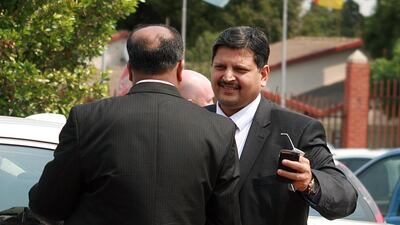If a company that employed 8,000 people and contributed substantially to a struggling economy faced financial ruin because it was shut off from the banks, should there not be a national outcry?
The Guptas, whom Atul Gupta told the Times of India last year have “invested more than 10 billion rand [Dh2.82bn] in South Africa”, have obviously irritated a number of people – but the matter does not reflect well on how business is done in South Africa.
Oakbay’s dealings clearly have to be fully investigated, and to the outsider the case does seem concerning.
The company is being investigated for 72 cases of alleged financial irregularities – not criminal transactions or fraud. But for some, the numbers count for nothing, if it is just one case of wrongdoing then that is enough to punish the Guptas.
But what does the Oakbay case mean more broadly for South Africa? Will the treatment of one non-white company mean that those in, say, the Arabian Gulf, wider Middle East and elsewhere, will hesitate to invest?
The country has the potential to become a powerhouse of southern Africa but right now it is stuck in the doldrums. Too few people own too much. A recent Oxfam survey found that the three richest South Africans have the same wealth as 50 per cent of the bottom half of the population.
South Africa’s business elite have already been warned about their closed-shop practices by the IMF. Last summer, David Lipton, the IMF’s number two, told large businesses and banks that they “maintain entry barriers against their potential competitors – SMEs”. He said: “In the finance sector, there are only a few retail banks in operation and their fees are high. Small enterprises have trouble accessing banking services. Entry into industry favours existing institutions.”
While many companies in South Africa have enjoyed solid profit, these were built “upon barriers that both hurt consumers and block potential competitors”, said Mr Lipton.
This is unsustainable for a country drenched in historical inequality. It is also not working well for the economy. SMEs clearly face a glass ceiling and black entrepreneurs struggle to get capital funding. This means there is little of the competition on which economies thrive, and that is especially important for one flatlining at below 1 per cent growth. South Africa also faces the embarrassment of seeing its foreign direct investment dropping to US$4.7 billion last year, only just ahead of Morocco at $4.5bn and Cote d’Ivoire on $3.5bn.
Illustrating the difficulties non-white entrepreneurs face, even the highly successful Hamza Farooqui’s attempt to free up capital for black entrepreneurs by buying a bank has struggled against leaks of classified financial data and indignant outbursts of alleged impropriety.
In the midst of this the four national banks stride undaunted through a scandal of serial rand manipulation, which has seen them forced to pay fines of 125 million rand by the South African Reserve Bank. International banks in the scandal have had to pay more than $10bn of penalties since Bloomberg first revealed manipulation in 2013. The country’s competition tribunal said global banks including Bank of America Merrill Lynch, HSBC, BNP Paribas, Credit Suisse Group, JP Morgan, Nomura International and Standard Chartered should be fined. Citigroup became the latest to feel the tribunal’s wrath last month when it agreed to pay a fine of $5.4m.
As the economy shrinks and unemployment grows things become tougher. It seems hard to contemplate South Africa turning into a “basket case” like Zimbabwe. But it could happen; if the wrong choices are made the path to self-destruction could become unavoidable.
The country now faces losing its investment-grade rating and that would have serious ramifications as foreign investors have rules that disallow owning junk bonds. That in turn could lead to a humiliating IMF bailout.
It appears, at least to some in the ruling ANC party, that reaching out for foreign investment while there is still a country to invest in could be South Africa’s salvation. Many admit that the country is not selling itself enough in the Middle East, arguing that merely having an embassy in an Arabian Gulf state such as the UAE is not enough.
The money will not simply come to South Africa; South Africans have to go to the money and bring investors out to the country to see its potential.
There is a huge opportunity for Middle East businesses in South Africa, in mining, property, the financial sector and agriculture. Despite a decline in infrastructure there is enough left to considerably improve the country’s chances of success. Millions need to be invested in railways, ports and roads and this in turn will improve the ability to efficiently export goods.
South Africa’s rich agricultural land could turn out enough produce to give the Gulf substantial food security.
Millions, if not billions, could be made from helping to develop the country’s energy sector, particularly the nuclear industry.
And underpinning all this is a uniquely industrious people, well-educated and, perhaps most importantly, with the enthusiasm to succeed. They just want to be given the chance.
business@thenational.ae
Follow The National's Business section on Twitter


